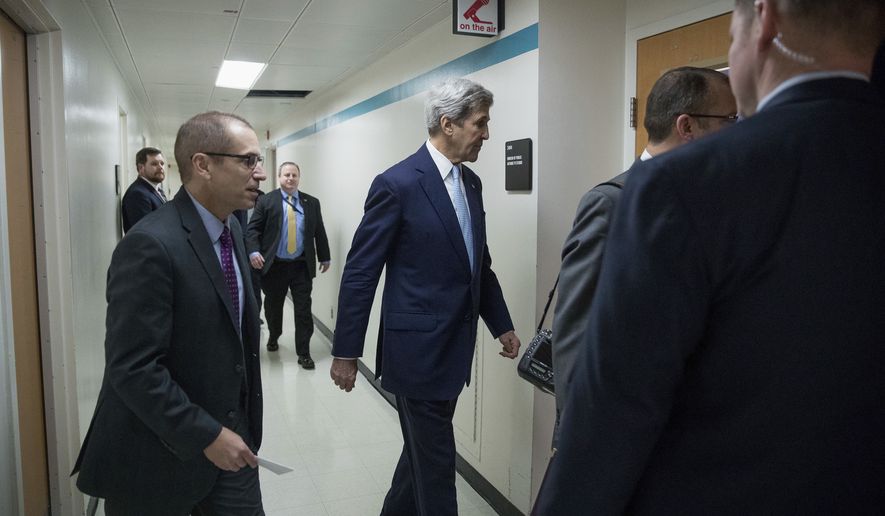Secretary of State John F. Kerry launched a rhetorical broadside against Israel Wednesday, saying Washington could not “protect or defend” the country should Tel Aviv continue to balk at two-state peace plans with Palestinians.
His comments drew swift and sharp rebuke from Israeli Prime Minister Benjamin Netanyahu, who chided Mr. Kerry by saying Israelis did “not need to be lectured” about peace by the outgoing administration, while President-elect Donald Trump weighed in even before the speech was given with a strong support for Mr. Netanyahu and Israel, and vowing his incoming administration would take a sharply different approach.
It was an extraordinary and extraordinarily public division between two longtime allies, one that could have lasting and incalculable consequences for the Israeli-Palestinian conflict and Washington’s traditional role as an honest broker and the main outside power in the Middle East peace process.
Mr. Kerry’s 70-minute speech, much of it devoted to a critique of the Netanyahu government’s policies, came a week after the Obama administration broke with longstanding U.S. practice and refused to veto a U.N. Security Council Resolution characterizing Israeli settlements on Palestinian territory as a “flagrant violation of international law.”
“The vote in the United Nations was about preserving the two-state solution — that’s what we were standing up for,” Mr. Kerry told an audience at the State Department, asserting that the Israeli settlement activity has “steadily grown” in recent years, dangerously inflaming tensions with Palestinians and jeopardizing any realistic path toward peace.
Israel “can be Jewish or democratic, it cannot be both,” he said, adding that without making some hard choices, Israel will never enjoy lasting peace.
In a press conference in Tel Aviv, Mr. Netanyahu expressed his “deep disappointment” over Mr. Kerry’s “one-sided” remarks, which he said failed to take into account the security challenges Israel faced.
“Israelis do not need to be lectured about the importance of peace by foreign leaders. Israel’s hand has been extended since Day One,” he said. “It is a shame that Secretary Kerry does not see this simple truth.”
Mr. Trump, in a barrage of tweets Wednesday morning, urged Israel to “stay strong” until he takes office next month, and accused the President Obama of erecting “roadblocks” to a smooth transition.
“We cannot continue to let Israel be treated with such total disdain and disrespect,” Mr. Trump said on Twitter. “They used to have a great friend in the U.S., but not anymore.”
Critics say the Obama administration’s decision not to veto Friday’s Security Council vote — which passed on a 14-0 vote — was equivalent to supporting the measure and marked a troubling departure from Washington’s long history of defending Israel at the U.N.
Such criticism “failed to recognize that this friend, the United States of America, has done more to support Israel than any other country,” Mr. Kerry said Wednesday. He argued the U.S. was essentially trying to save Israel from itself, and that the misguided settlement policy was isolating the Jewish state.
Sen. Benjamin L. Cardin, Maryland Democrat and Foreign Relations Committee ranking member, while backing a two-state solution, said he regretted the decision not to block the U.N. resolution. And Sen. Charles Schumer of New York, the incoming Democratic leader, said Israel’s unhappy experience when it withdrew from the Gaza Strip — and Palestinians used the territory to launch missile strikes into Israel — undercut the Obama administration’s arguments.
“While he may not have intended it, I fear Secretary Kerry, in his speech and action at the U.N., has emboldened extremists on both sides,” Mr. Schumer said.
Mr. Netanyahu expressed concern that a summit being organized by France next month could produce an international framework that the U.N. Security Council might then codify with Mr. Obama’s assent, boxing Israel in. Yet Mr. Kerry seemed to rule out the possibility the U.S. plans any new policy steps on the Israeli-Palestinian conflict before Mr. Trump is sworn in.
Mr. Kerry’s comments highlighted the longstanding rift in the diplomatic and personal relationship between Mr. Netanyahu and President Obama, which nearly froze after the administration’s nuclear deal with Iran. Despite White House denials, Mr. Netanyahu’s aides were saying Wednesday they had proof the Obama administration actively orchestrated the Security Council resolution and vote.
The timing of Mr. Kerry’s comments, so soon after the U.N. vote on Jewish settlements, was yet another example of that animosity, says one regional analyst.
“President Obama and [Secretary] Kerry could have led with this several months ago and set the stage for a U.N. vote while giving Israel an opportunity to engage,” said Jonathan Schanzer, vice president of research at the Foundation for Defense of Democracies.
For his part, Mr. Netanyahu said he was already looking forward to the incoming Trump White House, hoping to work with the new administration to “mitigate the damage this [U.N.] resolution has done.”
• Carlo Muñoz can be reached at cmunoz@washingtontimes.com.




Please read our comment policy before commenting.